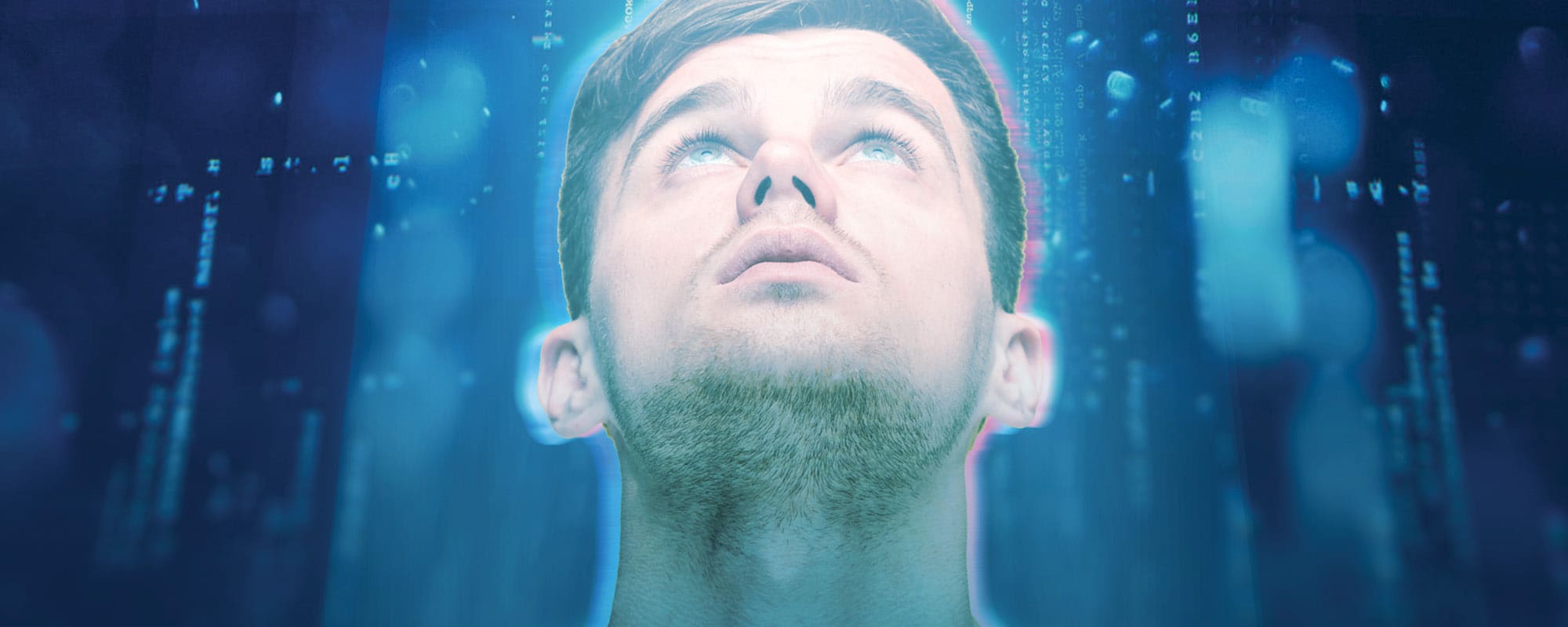What if technology allowed us to map our entire brain? What if we could upload ourselves into an online world to live forever once our body wears down? Would that be a genius piece of technology or a beehive of unethical practices?
Popular media has been filled with eerie futurism stemming from our present-day ubiquitous technology. Black Mirror, a British anthology television series with often dystopian episodes, has explored the concept of recreating human consciousness in the digital realm in several episodes (Be Right Back, White Christmas, and San Junipero). Similarly, Altered Carbon, an American cyberpunk television series based on Richard Morgan’s novels, delves into the notion of transferring consciousness from body to body—or sleeves. But even half a decade ago, Daniel F. Galouye’s 1964 novel, Simulacron-3, toyed with the idea of a virtual city whose digital inhabitants have their own consciousness, unaware that they are only electronic impulses—with the exception of one individual.
The concept of digital immortality has fascinated humans for long enough that some are convinced we are on the verge of achieving it due to our immense technological development. But has digital immortality really become viable?
Creating AI Profiles
‘From a technological point of view, it is possible up to a certain point,’ Dr Vanessa Camilleri told THINK magazine. Camilleri, who is a Senior Lecturer in Artificial Intelligence at the Faculty of Information and Communication Technology at the University of Malta (UM), explains that we can create AI-powered profiles of people for manipulated footage or chatbot discussions. But digitalising someone in their entirety remains a stretch too far.
Today, AI can assist in creating digitally manipulated footage of facial appearance and voices, known as deepfakes, through deep generative methods. This technology enables anyone to impersonate a country’s leader or a celebrity, perhaps reciting a poem from The Little Prince by Antoine de Saint-Exupéry at best—or spread hateful messages or disinformation at worst. As large language models (LLMs), such as Chat GPT or Microsoft’s Copilot, evolve and generative AI improves by the day, it is possible to create digital avatars of existing people. These avatars use big chunks of their verbal and non-verbal output from videos and written records, to carry out limited conversations with their digital copies. To a certain degree, this can be considered a form of digital immortality. We could create a chatbot of Albert Einstein and speak with it, which would be fun and Einstein-like, but would certainly not be the scientist himself.
No Digital Afterlife—For Now?
But can we hook up the human brain to a computer and create a copy of ones and zeros so someone could live in a virtual, digital world? ‘I think we are nowhere near that,’ Camilleri says. ‘I would not even try to suppose how it could work out from a technological perspective. Thoughts and emotions are so profound and complex. We understand more about the brain by the day, but we understand so little about how thoughts and emotions are formed in the brain. How are we supposed to create a digital copy of something we do not yet fully understand?’ Camilleri says.

Photo by James Moffett
To upload someone to a digital realm, beyond recreating their thoughts and emotions, we would essentially need to capture and encapsulate their mind and soul. ‘We are in a thought experiment,’ Francois Zammit, philosophy casual lecturer at UM and Principal Subject Area Officer at MATSEC, says. ‘Let us argue that the mind is data. Data can be replicated and transferred. But a counterargument to this will be that this is a reductionist understanding (an approach saying that we can best explain something by breaking it down and taking a look at each of its pieces) of what the mind is. Embodiment plays an essential role in our life,’ Zammit adds.
Zammit argues we simply have no identity without our bodies. From a phenomenological perspective, we experience the world as embodied beings. ‘We’re not just mind. We’re a mind and a body—that is how we experience our world. That is what gives us an identity,’ he adds.
Humans have invented and developed technology to track brain activity. CT (computed tomography) takes a fast series of X-ray pictures, while MRI (magnetic resonance imaging) uses strong magnetic fields to take such pictures. With such non-invasive technologies to inquire about the mind, we can see the brain light up in activity when a subject feels emotions. However, we do not know what actually happens under the hood. We see activities taking place here and there, but we do not know how the brain runs these processes. As an everyday example, we could think about using a remote control for our television set. As non-engineers, we understand that we can make our TV louder or quieter if we press the volume buttons. But we do not know how the remote control directs the TV. Brain researchers are in a similar situation.
If our knowledge of the brain was sufficient and our computing power allowed for true digital immortality, which would mean recreating someone in a digital world, the ethical repercussions of such a scenario would be worrying.
Ethical Beehive
‘Hypothetically speaking, let us say a loved one has signed an agreement to be digitally immortalised when dying. Such a scenario would profoundly affect the grieving process,’ Camilleri says. ‘Traditionally, humans evolved accepting that somebody, in their physical form, ceases to exist upon death. Grieving would move to a new plane if the deceased person lives on a hard disk. Also, we must consider the trauma of the person transferring to the digital. How can they process the death of their physical form and their encasement to a virtual world—becoming essentially bits and megabytes?’
The ethical conundrums get even more profound for third parties. ‘What will the moral responsibilities of the people who are maintaining these digital personas be? How about the right to privacy, freedom of expression, and property rights?’ Camilleri ponders. What happens in case of an electrical fault or a natural disaster destroying a part of a server park? How can a company running the technology to keep the digital versions of personas alive compensate for the loss of data—lives in this case? How about hackers getting into the digital realm to intercept knowledge and data from particular digital individuals to abuse that information in the world of the living?
‘We have also ethical-political aspects to consider,’ Zammit says. ‘Generally, people who have financial means have better access to technology. Are we going to have a new form of inequality where people who have access to immortality are people of financial status? What about certain politicians? Let us suppose an authoritarian state where the ruler becomes digitally immortal and they keep running the country for eternity. What are the ethical implications of that?’ Zammit adds.
The more we explore the idea of complete digital immortality, the more problematic it becomes, especially considering that humans are aware of their mortality. Someone’s perspective on death inevitably shapes their life. The fact that we have an expiry date gives meaning to our mundane, everyday tasks.
For the sake of this article, let us assume that genuine digital immortality would mean that after our body dies, we can live on forever in a digital realm—no ethical strings attached. That would mean humans defy the most basic laws of nature, the cycle of life, a phenomenon that everything adheres to, animals, plants—and in the long, long run our universe too. Would it do humans good if we went against those rules?
‘I am quite a strong advocate of balance in nature,’ Camilleri says. ‘Living creatures have a lifecycle; they are born and they die. This is what we, as humans, have been used to. I do believe that tampering with this lifecycle is not going to be good for people. I believe people are used to this cycle. Breaking this cycle, remoulding it into a straight line so one is born and then keeps going forever, will not benefit humanity,’ Camilleri concludes.
Author
-
Christian Keszthelyi is an English linguist-turned journalist, writer, PR flack–you name it. He contemplates a lot about life and writes every now and then.
View all posts





Comments are closed for this article!